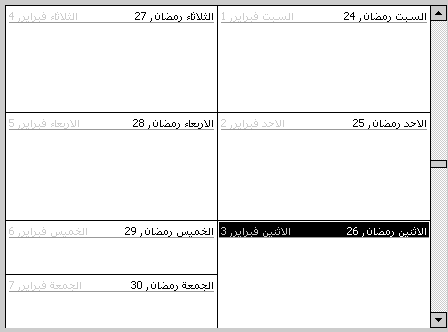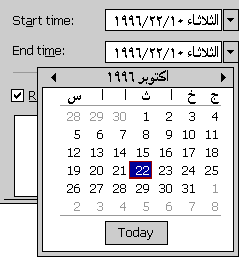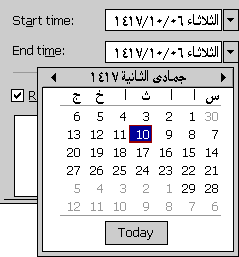Display an alternate calendar
This feature applies to any language that enables an alternate calendar: Arabic, English, Hebrew, Hindi, Chinese, Japanese, Korean, and Thai.
The short and long date formats, for example, 11/01/2018 or November 1, 2018, follow the date formats selected in the operating system's settings. The language of the month and weekday names depends on the country/region selected in the Region & language setting in Windows and on the calendar selected in the operating system. As a result, you can see alternate language or English Gregorian calendar month names or translated month names.
In this article
Alternate calendar views
Monthly calendar view
The monthly calendar view is affected by the calendar setting in the operating system.
You can view both calendar formats in this view. If this option is selected, the primary calendar appears on the right side of every cell, and the alternate calendar on the left side. The first cell will have both month names, and the beginning of each month in every format will display the corresponding month name.
Weekly calendar view
In the right-to-left calendar direction setting, the first day is at the top-right corner, and the last day is at the bottom-left corner. This is the opposite of the left-to-right layout. This example shows a right-to-left weekly view with Hijri as the primary calendar and Gregorian as the alternate calendar.

Display an alternate calendar
-
Click File > Options > Calendar.
-
Under Calendar options, select the Enable an alternate calendar check box.
-
In the list, select the language you want.
-
In the second list, click the calendar option you want.
-
On the Tools menu, click Options, and then click Calendar Options.
-
Under Advanced options, select the Enable alternate calendar check box.
-
In the list, select the language you want.
-
In the second list, click the calendar option you want.
Note: To quit displaying dual calendars, clear the Enable alternate calendar check box.
Dual calendar view
You can display dual calendar information in the Day/Week/Month views of Calendar. In the Week and Month views, information from both calendars will be available in every day cell.
The primary calendar information is displayed at the top-right corner of the day cells. Alternate calendar information is displayed as unavailable at the top-left corner of the day cells.
Notes:
-
When the primary calendar is not Gregorian, the format of the alternate calendar depends on the country/region setting in the Windows Region & language settings. This could be any of the available Gregorian calendar formats for that country/region.
-
When using dual calendars, you can view either calendar in its Day/Week/Month views. Some views can display information from each calendar. Additionally, date information in Table views can be displayed in either calendar.
Right-to-left calendar layout
Outlook supports both left-to-right and right-to-left calendar layouts. This layout affects the Day/Week/Month views. The right-to-left calendar layout displays days in the weekly and monthly views in mirror image view compared to left-to-right layout. The first day of the week shows on the right, and days increment as you go to the left. Date Navigator supports both layouts. When multiple Date Navigators are selected to display multiple month information, the layout of these months could be left-to-right or right-to-left.
Right-to-left features in Date Navigator
Date Navigator can be displayed in several views, depending on your choice of primary calendar and layout.


Outlook uses abbreviations in Date Navigator for the names of the days of the week.
Right-to-left features and the date parser
You can specify dates in multiple formats, including specifying a date by using the English day and month names, or by using alternate language day and month names. The date parser supports Arabic, English Gregorian, Hebrew, and Arabic-only Hijri month names. If you type a date using the day/month/year number format, the date parser will take you to that date in the current or primary calendar. However, you can specify a specific date by using month names that belong to the alternate calendar, and the date parser will take you to that day.
You can type a specific primary or alternate calendar date, and the date parser will be able to interpret it and move the calendar to that date.
For example, if the primary (system) calendar is Gregorian and the secondary calendar is Hijri, and you type 2/1/99 in the Date field of the Go To Date dialog box, the date parser will interpret it as 2 January 1999. If the primary calendar is Hijri instead, the date parser will interpret it as  .
.
No comments:
Post a Comment